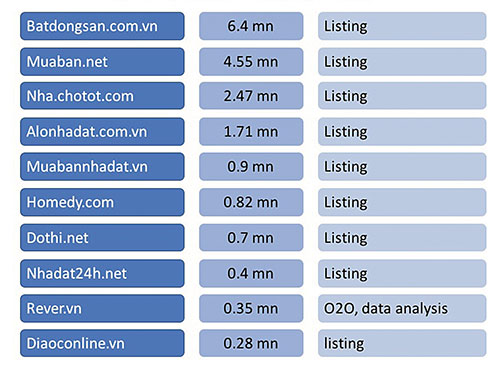|
Online real
estate brokerage gaining acceptance
VinaCapital’s flagship fund the Vietnam
Opportunity Fund (VOF) and Dragon Capital last month announced they spent $21
million acquiring a 25 per cent stake in the Century Land JSC (CenLand), one
of Vietnam’s leading real estate brokerages and the leader in the northern
region.
CenLand has focused on traditional sales channels since
2002, with its popular real estate supermarket system STDA, and has developed
its online brokerage platform Nghemoigioi.vn over the last two years.
Online channels contributed to the surging number of
the company’s transactions in 2017, at 11,555, an increase of 20 per cent
against 2016, thanks to real estate support technology.
“Online real estate has seen impressive growth of more
than 60 per cent over the last three years and is expected to continue
growing into the future,” said Ms. Le Hoang Uyen Vy, General Partner at ESP
Capital.
Fertile ground

In line with Vietnam’s burgeoning real estate market,
online brokerage has also found greater appeal among both local and
international investors.
The local market has witnessed a number of foreign
investors setting up business as well as many newly-established Vietnamese
startups receiving private equity (PE) investment over the last two years.
After Dot Property, a rapidly-growing property portal
based in Singapore, opened its first representative office in Ho Chi Minh
City in September 2016, another leading Asian online property group,
PropertyGuru, also announced a strategic investment to secure a 20 per cent
holding in Vietnam’s No. 1 property site, Batdongsan.com.vn, a month
later.
With support from PropertyGuru, Batdongsan.com.vn has
maintained its leading position in the country’s online property listings
market, with the highest traffic, of 6.4 million visits, every month,
according to figures from web measurement tool SimilarWeb.
2017 was an active year for fund raising by local
startups in the online property brokerage business. The Ho Chi Minh
City-based PE firm the Vietnam Investment Group (VIGroup) led a $2 million
Series A funding round in the first quarter to pick up 15 per cent in the
online-to-offline (O2O) real estate platform Congnhadat.net.
In the second quarter, one of the leading
transaction-focused classifieds businesses, Propzy Vietnam, successfully
mobilized $2 million from the Malaysia-based online classifieds business
operator Frontier Digital Ventures and other investors.
Another investment was made in Vietnamese property
portal Homedy.com, co-led by two Japanese early investors Genesia Ventures
and the Singapore investment house Vine Capital last year, following a
previous investment from ESP Capital.
Norway’s telecom group Telenor, meanwhile, last year
fully took over one of the largest online marketplaces in Vietnam, Cho Tot,
including its real estate classifieds platform, Cho Tot Nha.
Real estate inventories were estimated at around $1.15
billion last year, according to the Vietnam Housing and Real Estate Agency at
the Ministry of Construction.
There are no exact figures on the country’s online
property brokerage market, but it was estimated at nearly $400 million as at
the end of 2017, according to Mr. Phan Nhat Minh, Co-founder of Rever, a
brokerage startup on the O2O property platform and a provider of data
analysis.
Top 10 real estate websites, per visits

Source: VET research on
SimilarWeb
From offline to online
Founded in 2016, Rever has been a pioneer in using 3D
technology to introduce housing to customers. Mr. Minh believes that future
homebuyers will mainly be the younger generation, who are familiar with
technology and can save time seeing a 3D perspective online and not having to
actually visit the property.
“This has been a part of our digitalization itinerary,”
he said. “Over the past year, we have introduced a new search interface and
continued developing interactive and 3D models for real estate projects that
are able to be integrated into the Rever platform.”
Rever is a real estate brokerage startup on the O2O
platform, with online promotional products, marketing, and multi-link pages
for advertising for customers to make transaction quickly and for free. This
year it will offer new features for users, such as financial comparison and
calculation tools, data analytical tools to forecast real estate prices, and
an NPS measurement tool.
“From our first office in Ho Chi Minh City’s District
2, we have plans to expand to 14 locations in the city with 200 qualified
staff and record four-fold growth this year,” Mr. Minh said. “We are also
working with potential investors for upcoming fund raising.”
The 5,000 newly-registered real estate enterprises in
2017 is part of the rising quantity and quality of local brokerage startups
in Vietnam, according to Mr. Nguyen Ba Duc, Founder of Homedy.
The three-year-old startup is now among the Top 3
online real estate portals, with around 1.5 million visits per month, after
receiving financial support of around $1 million from three foreign investors
last year.
Homedy has invested in technology and in upgrading its
system infrastructure to provide greater access to its website. Its big data
system has been developed to support user behavior analysis and optimize
products. It has also researched and is in the process of testing intelligent
and highly-automated technologies.
“This year we plan to launch new versions of both the
website and the mobile app to further improve users’ experience and allow
them to find full information and increase ads by at least five-fold every
year,” Mr. Duc said.
With a tech-savvy population and high internet
penetration, online property brokerage and listings in Vietnam help to
further grow the local real estate sector, as buyers are exposed to more
choices in a transparent manner, which enables them to compare and make
informed decisions, according to Mr. Bryan Teo, CEO of Cho Tot.
“We experienced this exciting trend when monthly
successful transactions so far in 2018 have risen 24 per cent and the number
of ads in the first quarter increased 40 per cent year-on-year,” he told VET.
Cho Tot Nha is a customer-to-customer (C2C) platform
where users can buy and sell property directly from each other and are
responsible for the transaction and payment, which take place offline. “We
have invested resources and technology in an ad-review system,” Mr. Teo
said.
“Cho Tot Nha’s ad-review team has been trained in the
specific characteristics of this sector to increase the accuracy of ads.” It
has also developed a feature that allows buyers to report ads on the site and
quickly handle any reports from buyers. He also said that, in the future, Cho
Tot plans to work with stakeholders to identify brokers, ask them to create
their own profiles, and record their transaction history to build up and strengthen
the trust of users.
Changing mindsets
Technology, by definition, involves innovation, so all
online real estate brokerages must change and develop in order to stay
abreast of the market, according to Mr. Duc from Homedy.
“Technology investment is among the challenges not only
for Homedy but also for others,” he said.
“Both online and offline hold certain advantages and
disadvantages. Traditional brokerage is not competitive in closing deals, as
it takes much time. Conversely, the online model can classify potential
customers for brokers, saving time and human resources.”
In the long run, the online property brokerage business
has been forecast to increasingly compete and replace traditional real estate
agencies, using technology to supplement or even replace agents so that
buyers and sellers pay lower transaction costs, according to Mr. Teo. This is
generally in line with other “disrupting” technologies that result in
consumers getting faster and better service at a lower cost.
However, “along with local customers still preferring
to purchase property via an actual agent, legislation to regulate property
ownership in Vietnam is still evolving and the property conveyancing process
is also in the development stage,” he added.
“In such a complex environment, buyers and sellers
still need professional advice to guide them in property transactions. As
such, technologies will not replace agents in the immediate future.”
He also said that Vietnam’s online property brokerage
market has lots of room to grow. The first step in such development is
information transparency, where online listing sites come into play.
There’s a growing demand for efficiency and
transparency in the real estate industry, and one online platform has been
listening. By striving to create an open, user-friendly platform where demand
and supply can be matched by just a click, online property brokerage sites
have gradually eked out a position in the market.
VN Economic
Times
|
Thứ Tư, 23 tháng 5, 2018
Đăng ký:
Đăng Nhận xét (Atom)
Không có nhận xét nào:
Đăng nhận xét